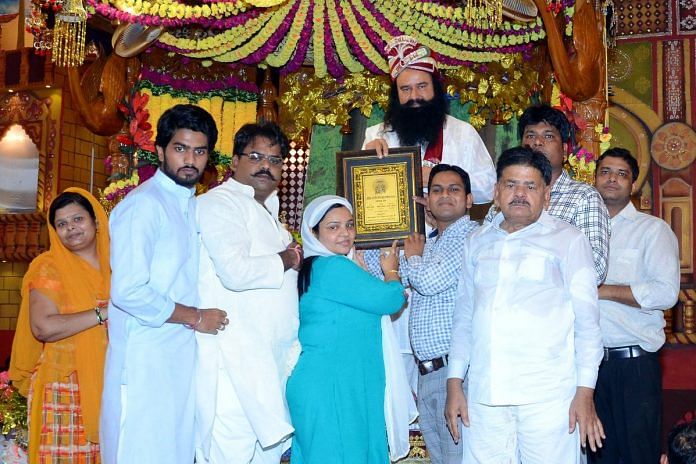Gurmeet Ram Rahim Singh became a political force as he began influencing elections to escape criminal cases.
When asked Saturday if it was time for political parties to end their patronage to deras and godmen in Punjab, Chief Minister Captain Amarinder Singh said that the way things were going, eventually politicians will stop flocking to them.
So will Gurmeet Ram Rahim Singh’s sentencing hasten this process? A senior Akali leader, who did not want to be named, rather candidly said, “It’s good he (Ram Rahim) is in jail now. At least we will not be under pressure to go to him.”
The godman’s support was important to most political parties. The Dera’s devotees —which largely consist of Dalits — could swing election results by voting en masse and in seats where the battle between candidates was close their votes could mean the difference between winning and losing. On the flip side, a politician not going to the dera risked earning the ire of the godman who could then ask his followers to vote against him and his party.
Gurmeet Ram Rahim knew his political significance and reveled in the attention. Ram Rahim took over as the chief of the Dera in 1990. Initially, when politicians met him to seek his blessings, he largely remained apolitical and the devotees made their own choices. But in 2002 when investigations into allegations of rape and murder began against him, Ram Rahim’s stance changed. Some believe that his covert support for the Congress in Punjab that year helped them come to power under Captain Amarinder Singh.
Five years later, before the next assembly polls in Punjab, the dera then did something not many godmen do in Punjab or Haryana: it became openly political. The dera created a 15-member political affairs wing to guide followers on who to vote in the elections. In 2007 while the Baba had three FIRs registered against him, he declared his support for the Congress. The Congress lost the elections, but did well in the seats in the Malwa region where the dera has the bulk of its followers.
With Akali-BJP in power, the dera was in for trouble. In May 2007, advertisements of Ram Rahim appeared in which he was dressed like Guru Gobind Singh. This prompted the Akal Takth, the highest temporal seat of the Sikhs to pass a severe edict against it. A case was registered against Ram Rahim for hurting religious sentiments.
Violent clashes broke out between members of the Sikh community and the dera’s devotees (called premis) when devotees of the godman were barred from congregating for satsangs in Punjab. Tensions due to that incident continue even now.
However, that did not stop the Akalis from approaching the dera, despite their biggest vote bank being the Sikh community. It is common knowledge that two years later, during the parliamentary polls, the Akalis sought the help of the dera to ensure Parkash Singh Badal’s daughter-in-law Harsimrat Badal won the Bathinda seat. She was up against Amarinder Singh’s son Raninder.
For the rest of the seats, the dera authorised its followers to vote as per their choice and its votes largely went to Congress, both in Punjab and Haryana. In the 2009 assembly polls in Haryana, dera men became direct contenders for political power. Dera followers demanded over 30 seats in the 90-seat assembly. But the demand didn’t yield any result. The dera voted seat-wise, mostly helping Congress candidates.
After the 2009 parliamentary polls, the Akali’s stand towards the dera changed and devotees were allowed to run and expand their congregation centres called naam charcha ghar. In what seemed like a quid pro quo, days before the 2012 assembly elections, the police filed a cancellation report in the criminal case against the godman that had been registered in 2007. The Dera responded by shifting its loyalties from the Congress to SAD-BJP combine.
In the 2014 parliamentary polls, the Dera supported the BJP in both Punjab and Haryana. During the Haryana assembly polls held the same year, Prime Minister Narendra Modi praised the dera’s cleanliness drives in his election rally in Sirsa. Later he also tweeted his appreciation for Gurmeet Ram Rahim. The dera announced its support for the BJP in the polls, who made history by winning the 2014 assembly elections.
For the Akalis, the 2012 victory was historic as they had managed to retain power for two terms, something that had never taken place before in Punjab. They attributed a part of their success to the dera and they wanted to bridge the gap between the dera and Sikhs further.
In 2015, the Akal Takht pardoned the godman for the 2007 incident after he issued a written apology sent by him. However, after protests from Sikh organisations the apology was revoked. Facing anti-incumbency, the Akalis’ stand against the dera only increased the anger against it. The protests now targeted more than the naam charcha centres. The Baba’s films were not allowed to run in theatres in Punjab by Sikh bodies, who threatened to vandalise the theatres.
For the 2017 assembly polls, the dera once again announced its support for the SAD-BJP combine. But the move worked against the Akalis. Their staunch, and unforgiving, vote bank saw this as a deal between the Akalis and the dera. Even the traditional vote bank of the Akalis shifted to the Congress.



